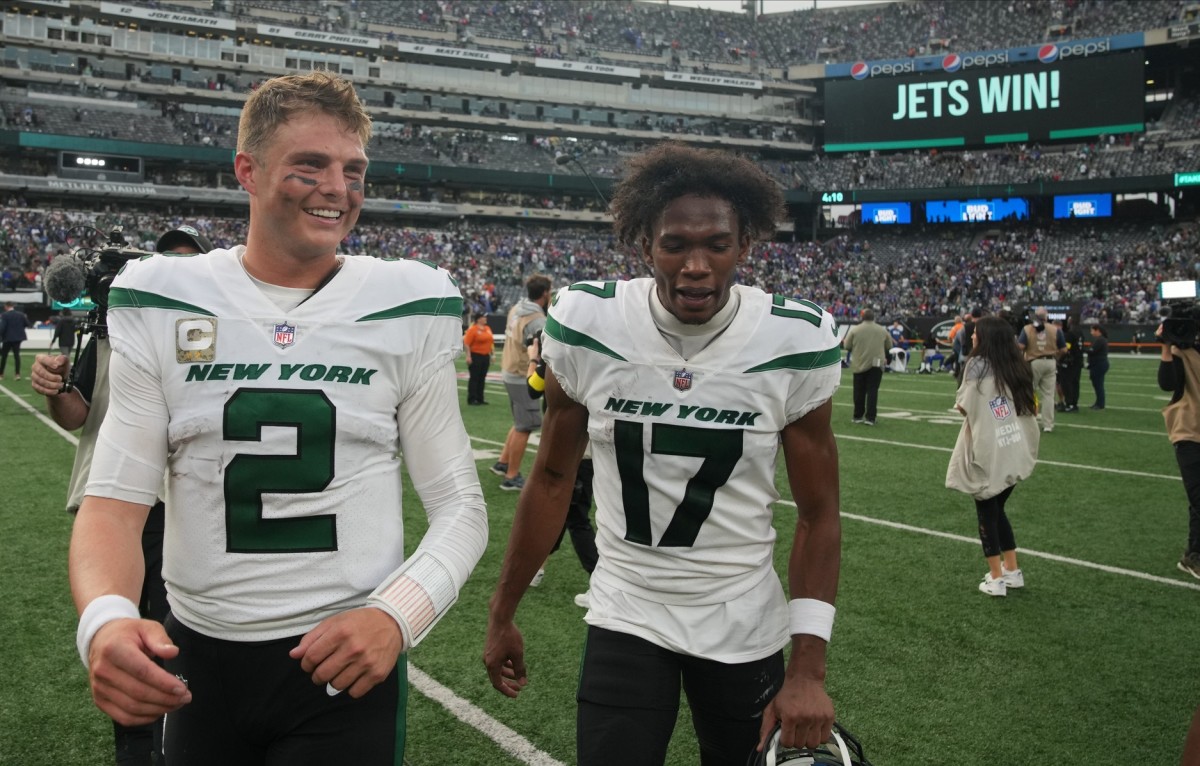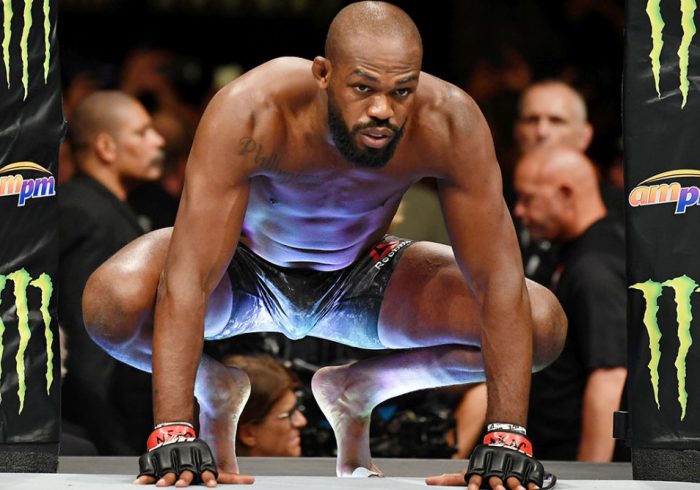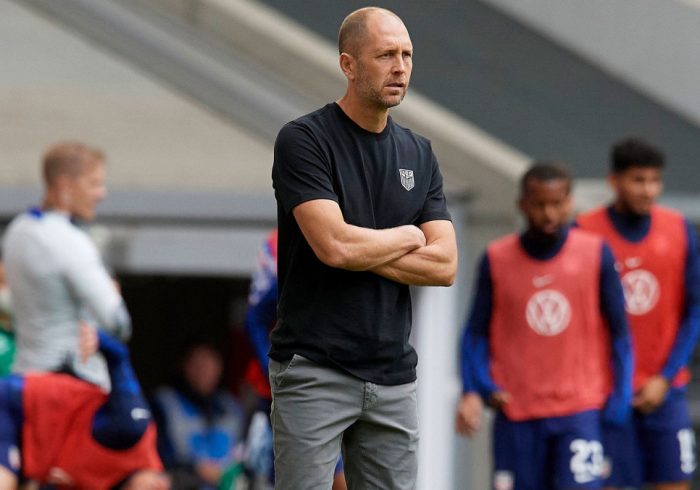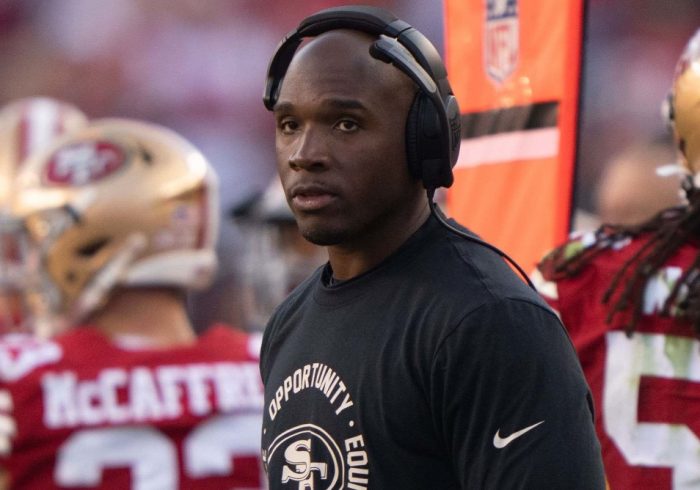The Jets’ 20–17 win over the Bills on Sunday was the franchise’s most significant victory since Jan. 16, 2011. You know, the time they knocked the Patriots out of the divisional round of the playoffs.
Before calling this hyperbole, take a gander back at the last decade of Jets football. By the time we’re finished, I may have you convinced that Sunday’s win was even more important for the overall course of the franchise.
In both cases, this was an outcome that helped a team outgrow a label, an old caterpillar cocoon that made it out to be something less than, now and forever. During the early 2000s, the Jets dealt consistently with the idea that they were intellectually inferior to the Patriots. At best, they were the buffoons who might trip into some measure of good fortune every once in a while. At worst, they were loudly irrelevant, the kind of team that could not even fail quietly.
Zach Wilson and Garrett Wilson celebrate the Jets’ 20-17 win over the Bills.
Chris Pedota/USA TODAY Sports
Over the past three years, the Bills have positioned themselves as the new divisional measuring stick, a team less known for outsmarting its opponents than simply bludgeoning them into submission. The Jets needed to exhibit complete and total growth in every facet of the organization on Sunday to even cover the spread in a game such as this against Buffalo. They needed to outcoach one of the best coaches (Sean McDermott) in the NFL, and did. They needed to outscheme one of the best defenses in the NFL, and, situationally, they did. They needed to pin down an MVP candidate who is tearing through the league at a 2015 Cam Newton–like pace. Josh Allen, who finished the game with no touchdowns and two interceptions, five sacks and a paltry six-yards-per-pass average, had by far his worst game of the season, saying after the game that he played like “s—.” There were certain third downs where he’d drop back and look out into absolute nothingness, a void of perfect coverage in which every receiver was accounted for with no good place to chuck the football.
The end result: The Jets are now 6–3, sitting a mere half game behind the 6–2 Bills for first place in the AFC East at the season’s official midpoint.
But it was the way in which the Jets beat the Bills that makes this win not only a hallmark victory for the franchise but, perhaps, the hallmark victory for the franchise. Their leading rusher, Michael Carter (12 carries, 76 yards, TD), was a fourth-round pick in 2021. Their leading receiver, Garrett Wilson (eight catches, 92 yards), who was absolutely brilliant on Sunday, was one of the team’s first-round picks in ’22. Sauce Gardner, the other top pick in April, had an interception; he manned Stefon Diggs on the Bills’ final, last-gasp effort to come back; he stepped up and made tackles when Allen escaped the pocket and shut down whatever quadrant of the field on which he happened to be standing. Jermaine Johnson II, another first-round pick, had a sack. Zach Wilson wasn’t perfect, but converted critical fourth-down situations. He was not dominant, but after a loss the previous week to the Patriots that opened the door to some broader questions as to whether Wilson could be the future quarterback of this franchise, he played well enough. That in itself is worth noting.
The Jets trailed 14–10 at halftime, but recovered defensively after punter Braden Mann slipped on the opening kickoff and handed the league’s most punishing offense the ball at midfield. They acted like a version of themselves that they are actively creating, and not a version of themselves that they inherited from decades of bad football.
The hand-selected core of this team played as advertised. The coaching staff coached as advertised. Everything we were promised about this team more than a year ago—that it would play physical defense, that it would run the ball well, that it would stop falling down like old clapboard siding every time a good team walked into its stadium—was delivered, about 10 months sooner than any reasonable person thought it could be.
Those who disagree will note that Urban Meyer’s Jaguars beat the Bills a year ago and that Allen was due for an off night. They’ll (fairly) keep the magnifying glass over Zach Wilson’s head and note that teams that have depended on wildly efficient defenses to win games in spite of their quarterbacks often struggle to find sustainable success (save, perhaps, for the Seahawks team with which Saleh is intimately familiar).
It’s true that we do not know what will happen next. But when we hold this win alongside the exorcism in 2011 against Bill Belichick and the Patriots, we’re thinking about how one team is younger, one team is less combustible (theoretically from a cap standpoint and an emotional, locker-room standpoint) and how one team has found its heart and soul so much earlier. We’re thinking about a roster built from nothing, which, over the span of less than two seasons, has already beaten the Bengals (’21 AFC champions), the Titans (’21 AFC No. 1 seed) and the Bills (the best team in football this year).
Now hearing the word Jets doesn’t automatically have to mean something comical. This win could be the precursor to the Jets actually belonging, to logging individual wins with enough regularity that we don’t have to label them with such significance.
More NFL Coverage:
• The Packers’ Offense Is Damaged, and Aaron Rodgers Is Acting Like It
• Commanders Possible Sale: Price Tag and Potential Buyers
• Trade Deadline Grades for Every Deal
• Inside the Christian McCaffrey Trade and His Historic Day Against the Rams
• NFL Trade Deadline Winners and Losers



